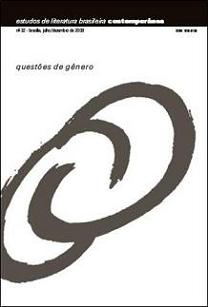O interdito no ideal de nação:
a lesbiana existe para a literatura brasileira?
Abstract
O discurso literário é androcêntrico e canônico e, como tal, é um produto social comum aos valores construídos e incorporados como naturais ao homem e à mulher. Se a literatura heterossexual de autoria feminina sofreu um processo de desprestígio e de silenciamento, ao longo dos séculos, que dizer da literatura de autoria feminina de temática homoafetiva? Analisarei o porquê do silenciamento e marginalização de produções literárias que transitam pela temática da homoafetividade feminina, a partir da produção de Cassandra Rios, autora pioneira na construção de uma literatura gendrada no que se refere à sexualidade lesbiana.
References
BEAUVOIR, Simone de. O segundo sexo. Rio de Janeiro: Nova Fronteira, 1980.
BUTLER, Judith. Problemas de gênero: feminismo e subversão da identidade. Rio de Janeiro: Civilização Brasileira, 2003.
_______. “Contingent foundations: feminism and the question of Postmodernism”. Cadernos Pagu, v. 11. São Paulo, 1998, pp. 13-42.
DERRIDA, Jacques. A escritura e a diferença. São Paulo: Perspectiva, 2002.
FOUCAULT, Michel. História da sexualidade I: a vontade de saber. Rio de Janeiro: Edições Graal, 1998.
_______. Vigiar e punir. Petrópolis: Vozes, 1997.
HARAWAY, Donna. “O humano numa paisagem pós-humanista”. Revista Estudos Feministas, v. 1, nº. 2. Rio de Janeiro, CIEC/UFRJ, 2o. sem. 1993, pp. 277-92.
LOURO, Guacira Lopes. Um corpo estranho: ensaios sobre sexualidade e teorias queer. Belo Horizonte: Autêntica, 2004.
PINTO-BAILEY, Cristina Ferreira. “O desejo lesbiano no conto de escritoras brasileiras contemporâneas”. Revista Iberoamericana, v. LXV, nº. 187, abr.-jun. 1999, pp. 405-21.
PIOZEVAN, Adriana. Amor romântico x deleite dos sentidos: Cassandra Rios e a identidade homoerótica feminina na literatura (1948-1972). Dissertação de Mestrado. Universidade Federal do Paraná, 2005.
PRINS, Baukje e MEIJER, Irene Costera. “Como os corpos se tornam matéria: entrevista com Judith Butler”. Revista Estudos Feministas, v. 10, nº. 1. Florianópolis: CFH/CCE/UFSC, jan.-jun. 2003. pp. 155-67.
SCHMIDT, Rita Teresinha. “Escrevendo gênero, reescrevendo a nação: da teoria, da resistência, da brasilidade”, em DUARTE, Constância Lima (org.). Gênero e representação: teoria, história e crítica. v. 1. Belo Horizonte: Editora da Universidade Federal de Minas Gerais, 2002. pp. 32-44.
SHOWALTER, Elaine. “A crítica feminista no território selvagem”, em HOLLANDA, Heloisa Buarque de (org.) Tendências e impasses: o feminismo como crítica da cultura. Rio de Janeiro: Rocco, 1994.
SANTOS, Rick. “Cassandra Rios e a literatura gay e lésbica surgida no Brasil”. Niterói, v. 4, nº. 1. 2º. sem. 2003, pp. 17-31.
WOOLF, Virgínia. Um teto todo seu. Rio de Janeiro: Nova Fronteira, 2004.
Downloads
Published
Issue
Section
License
Authors who publish in this journal agree to the following terms:
a) The authors maintain the copyright and grant the journal the right of first publication, the work being simultaneously licensed under the Creative Commons Attribution License-Non Commercial 4.0 which allows the sharing of the work with acknowledgment of the authorship of the work and publication this journal.
b) Authors are authorized to enter into additional contracts separately, for non-exclusive distribution of the version of the work published in this journal (eg publish in institutional repository or as a book chapter), with authorship recognition and publication in this journal.
c) Authors are allowed and encouraged to publish and distribute their work online (eg in institutional repositories or on their personal page) after the editorial process, as this can generate productive changes, as well as increase the impact and citation of published work (See The Effect of Free Access).
d) The authors of the approved works authorize the magazine to, after publication, transfer its content for reproduction in content crawlers, virtual libraries and the like.
e) The authors assume that the texts submitted to the publication are of their original creation, being fully responsible for their content in the event of possible opposition by third parties.


